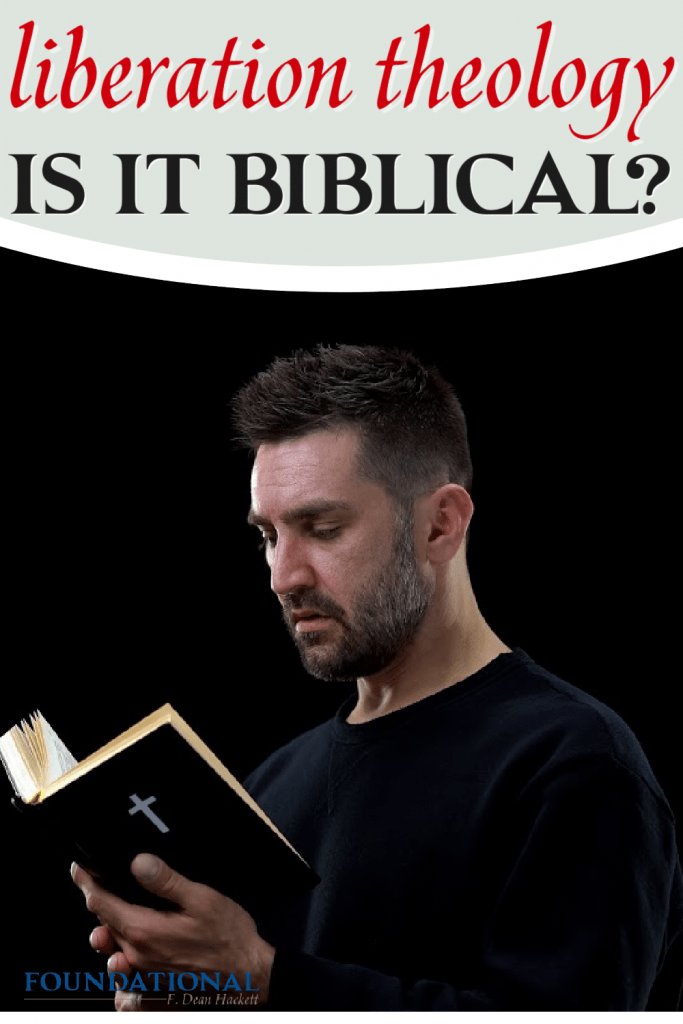Liberation Theology – Is it Biblical?
I hope you love the products and resources I recommend here at Foundational. It is possible that I get a commission and collect income from the links on this page. Click here for more info.

The early proponents of the Christian social justice movement, Washington Gladden, William Dwight Porter Bliss, and Walter Rauschenbusch developed a new biblical message that became known as “The Social Gospel.”
It was not the Gospel message of the Apostles based upon the redemptive sacrifice of the death burial and resurrection of Jesus Christ.
Indeed, these men and their followers denied the substitutionary sacrifice of Jesus Christ and preached a gospel of good works and social reform.
Their writings and teachings skirted closely the writings of social reformers of that same era, such as Alfred North Whitehead, Karl Marx, and Friedrich Engels.
Their efforts to blend the Holy Scriptures with this new doctrine of socialism led to the rise of the “Social Gospel” doctrine that gained footing and traction in the early decades of the 20th Century.
The new “social gospel” of the twentieth century found a natural home in the African American Christian community of the 1950’s and 1960’s.
Protestant pastors and theologians embraced it as they sought to reconcile the injustices of slavery, Jim Crow laws, and the rise of the black power movement.
The social gospel movement of the late nineteenth and early twentieth century became the foundation for the new “Liberation Theology” being developed by theologians and pastors in the African American church.
A new movement was happening at this same time in the Roman Catholic Church in Latin America.
A Peruvian priest, Gustavo Gutierrez, was developing a new theology to deal with the poverty of his nation and other Latin American nations.
His writings stirred the heart of Roman Catholic theologians and they began developing a Roman Catholic Liberation Theology.
This new theology in the African American church and the Latin American Roman Catholic Church had deep roots in Marxism.
By ‘poor’ we do not really mean the poor individual who knocks on the door asking for alms. We mean a collective poor. The ‘popular classes’; the poor are also the workers exploited by the capitalist; the under-employed, those pushed aside by the production process”
Boff and Boff 1987, cited under Leonardo Boff Oxfordbibliographies.com
We are seeing this same pattern in the 21st Century as Evangelical and Pentecostal movements are painfully seeking to address social justice issues of this millennium.
They are blending the Holy Scriptures with the Critical Race Theory, Intersectionality, and “White Privilege” doctrine.
Union Theological Seminary professor and founder of the Black Liberation Theology, Dr. James H. Cone wrote, “White supremacy the American Church’s greatest, original and most persistent sin.”
Duane Terrence Loynes Sr. presented in his dissertation to Marquette University for a Doctorate in Philosophy, entitled, “A God Worth Worshipping, Toward a Critical Race Theology,”
Although the Church has engaged in numerous attempts to remedy racism, theology still seems to witness to a God that stands relatively unopposed to the status quo of racial injustice and marginalization. This dissertation begins with the claim that Christian theology still operates from the normativity of whiteness. I will argue that, although the Church has made admirable progress with regard to racial justice, the attempts have been at the surface: the underlying structural logic of White supremacy remains intact.”
These are only two voices among many in the Christian community that are declaring the church white supremacist.
Are these statements accurate?
Has the western Gospel become polluted with “white privilege?”
Does Liberation Theology and biblical justice stand together?
Answers to those questions must begin with a clear understanding of the origin of Critical Race Theory, Intersectionality, and the concept of “White Privilege.”
June 2019, the Southern Baptist Convention officially adopted a resolution embracing Critical Race Theory and Intersectionality as tools for developing racial reconciliation within the Christian community.
Pastor John Piper recently weighed in with a very confusing and convoluted statement on Critical Race Theory and Intersectionality.
The Vineyard Movement has taken a very strong position.
Phil Strout, National Director, Vineyard USA has sent out messages and resources and the Vineyard website has a plethora of resources; all espousing “White Privilege” and endorsing Critical Racial Theory and Intersectionality.
I will allow the origins of these theories speak for themselves.
It will be easy to see the Christian church is being deceived and are embracing a lie carefully sown by the enemy among the wheat.
Critical Race Theory has its origin and roots in the philosophy “critical theory.” The Encyclopedia Britannica states,
Critical theory, Marxist-inspired movement in social and political philosophy originally associated with the work of the Frankfurt School. Drawing particularly on the thought of Karl Marx and Sigmund Freud, critical theorists maintain that a primary goal of philosophy is to understand and to help overcome the social structures through which people are dominated and oppressed.
Encyclopedia Britannica, britannica.com
Stanford Encyclopedia of Philosophy gives a detailed history and description of “critical theory.” Here is a portion of that statement.
Critical Theory has a narrow and a broad meaning in philosophy and in the history of the social sciences. “Critical Theory” in the narrow sense designates several generations of German philosophers and social theorists in the Western European Marxist tradition known as the Frankfurt School. According to these theorists, a “critical” theory may be distinguished from a “traditional” theory according to a specific practical purpose: a theory is critical to the extent that it seeks human “emancipation from slavery”, acts as a “liberating … influence”, and works “to create a world which satisfies the needs and powers” of human beings (Horkheimer 1972, 246). Because such theories aim to explain and transform all the circumstances that enslave human beings, many “critical theories” in the broader sense have been developed… Critical Theory in the narrow sense has had many different aspects and quite distinct historical phases that cross several generations, from the effective start of the Institute for Social Research in the years 1929–1930, which saw the arrival of the Frankfurt School philosophers and an inaugural lecture by Horkheimer, to the present. Its distinctiveness as a philosophical approach that extends to ethics, political philosophy, and the philosophy of history is most apparent when considered in light of the history of the philosophy of the social sciences. Critical Theorists have long sought to distinguish their aims, methods, theories, and forms of explanation from standard understandings in both the natural and the social sciences… They do not merely seek to provide the means to achieve some independent goal, but rather (as in Horkheimer’s famous definition mentioned above) seek “human emancipation” in circumstances of domination and oppression… any philosophical approach with similar practical aims could be called a “critical theory,” including feminism, critical race theory, and some forms of post-colonial criticism. In light of the practical goal of identifying and overcoming all the circumstances that limit human freedom, the explanatory goal could be furthered only through interdisciplinary research that includes psychological, cultural, and social dimensions, as well as institutional forms of domination… Given the emphasis among the first generation of Critical Theory on human beings as the self-creating producers of their own history, a unique practical aim of social inquiry suggests itself: to transform contemporary capitalism into a consensual form of social life. For Horkheimer a capitalist society could be transformed only by becoming more democratic, to make it such that “all conditions of social life that are controllable by human beings depend on real consensus” in a rational society (Horkheimer 1972, 249–250). The normative orientation of Critical Theory, at least in its form of critical social inquiry, is therefore towards the transformation of capitalism into a “real democracy” in which such control could be exercised (Horkheimer 1972, 250). In such formulations, there are striking similarities between Critical Theory and American pragmatism.
Stanford Encyclopedia of Philosophy, Stanford.edu
I apologize for this lengthy quote, but it is very important to understand the origin and meaning of Critical Theory because it is the root and origin of Critical Race Theory.”
It is obvious Critical Theory is first and foremost socialist, Marxist, and Communist in philosophy and ideology.
The founders of Liberation Theology, Critical Race Theory, and Intersectionality are fundamentally socialist, Marxist, and Communist in ideology and philosophy.
“Intersectionality” is a theoretical framework that has been developed for understanding how aspects of one’s social and political identities might converge into unique modes of discrimination.
It was specifically developed for addressing issues of feminism and women of color and has expanded into gender and human sexuality.
Young Woman of Boston, Massachusetts, website defines “Intersectionality” as a framework for conceptualizing a person, group of people, or social problem as affected by a number of discriminations and disadvantages.
It takes into account people’s overlapping identities and experiences in order to understand the complexity of prejudices they face.
In other words, intersectional theory asserts that people are often disadvantaged by multiple sources of oppression:
- Their race
- Class
- Gender identity
- Sexual orientation
- Religion
- and other identity markers.
Intersectionality recognizes that identity markers (e.g. “female” and “black”) do not exist independently of each other, and that each informs the others, often creating a complex convergence of oppression. (YW Boston – Young Woman Boston – website – “What is Intersectionality”)
Kimberle’ Crenshaw, law professor and social theorist, first introduced the theory of “Intersectionality” in 1989 through a paper titled, “Demarginalizing the Intersection of Race and Sex: A Black Feminist Critique of Antidiscrimination Doctrine, Feminist Theory and Antiracist Politics.”
Dr. Crenshaw is considered a leading scholar of the Critical Race Theory and currently sits as professor at the UCLA School of Law and Columbia Law School.
The whole concept of “White Privilege” in the Christian church has its origins in the deconstructionism of the Marxist Critical Theory.
It comes right out of the Lucifer’s play book, to weaken the church and to distort the Gospel message.
It is not historically accurate. It is not biblically accurate. It has no place in the pulpits and Bible classes of the church.
There is no harmony between these social theories and the Gospel. Indeed, they are opposed to one another.
The Social Gospel, Liberation Theology, Critical Race Theory, and Intersectionality, and “White Privilege” are rooted in social reconstruct based upon humanistic ideology.
They fail to address the true root problem of man.
The effort to blend these social theories with the Gospel of Jesus Christ will only result in the loss of the true Gospel.
The Apostle John wrote it well when he addressed the three root problems of mankind.
“Do not love the world or the things that in the world. If anyone loves the world, the love of the Father is not in him. For all that is in the world – the lust of the flesh, the lust of the eyes, and the pride of life – is not of the Father but is of the world. And the world is passing away and the lust of it; but he who does the will of God abides forever (1John 2:15-17 NKJV).
So again, we ask. “Does poverty need to be addressed? Yes.
Does racial reconciliation need to be addressed? Absolutely.
Not through a fractured version of the Gospel of Jesus Christ and certainly not through a Socialist, Marxist, Communist ideology.
No where in human history have these theories and ideologies successfully addressed the human plight.
They have consistently produced even greater bondage.
Jesus said it. If you abide in My word, you are My disciples indeed. And you shall know the truth and the truth shall make you free (John 8:31-32 NKJV).
It is biblical justice that sets men free.
There is plenty of historical evidence to verify that is the true means of bringing justice for all human beings of all color, gender, and social status.
The third blog in this trilogy will look at the biblical principles of justice; application of those principles; historical record of the power and effectiveness of biblical justice.
More articles like this
Is Social Justice Biblical Justice?
A Biblical Answer to Black Lives Matter






